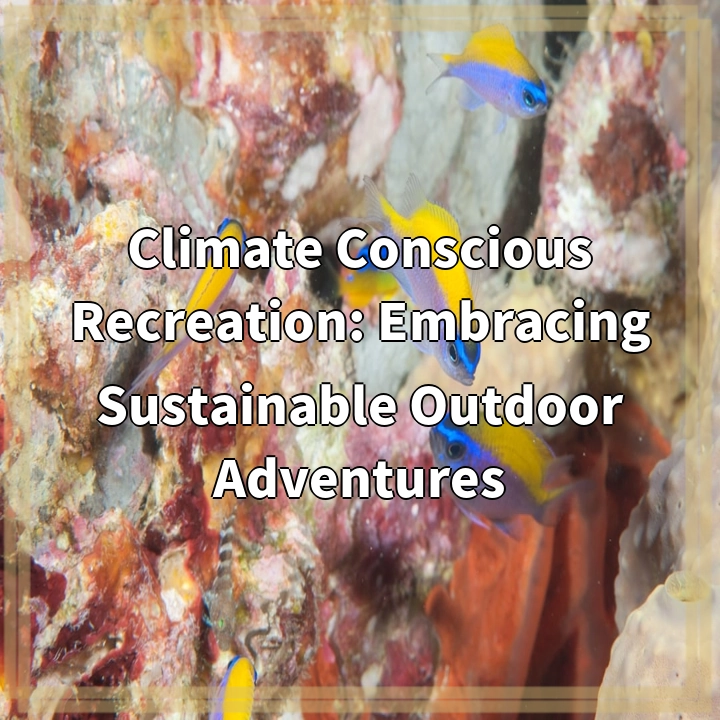
What it is:
Climate Conscious Recreation refers to outdoor activities that prioritize environmental sustainability while enjoying and engaging with nature. This form of recreation encourages individuals and communities to participate in activities like hiking, biking, kayaking, and camping in a way that minimizes ecological impact. It emphasizes practices such as Leave No Trace principles, wildlife conservation, and the use of eco-friendly equipment. The goal is to preserve natural spaces for future generations while still enjoying the benefits of outdoor activities.
The Essence of Climate Conscious Recreation
At its core, Climate Conscious Recreation advocates for a balance between leisure and environmental stewardship. It aims to educate outdoor enthusiasts about the implications of their choices, fostering a deep respect for nature. By choosing sustainable practices and supporting conservation efforts, individuals can engage in recreation that not only provides personal enjoyment but also contributes to the health of our planet.
Real-World Problems
Despite the inherent benefits of Climate Conscious Recreation, several real-world problems hinder its widespread adoption and effectiveness. Understanding these challenges is crucial for fostering a more sustainable approach to outdoor activities.
Overtourism
Overtourism is a significant issue affecting many natural parks and recreation areas. When areas become too popular, the sheer volume of visitors leads to environmental degradation, including soil erosion, damage to vegetation, and threatened wildlife habitats. Popular destinations often struggle to manage the influx of tourists, which can result in a decline in the quality of the natural experience.
Climate Change
Climate change poses a direct threat to outdoor recreation. Changing weather patterns, rising temperatures, and more frequent extreme weather events can alter the landscape and availability of recreational activities. For instance, shorter snow seasons affect winter sports, while droughts can limit access to waterways for kayaking and fishing.
Access and Inclusivity
Many outdoor recreational opportunities are not accessible to everyone. Barriers such as cost, transportation, and geographic location can prevent marginalized communities from engaging in Climate Conscious Recreation. Ensuring inclusivity is vital for promoting sustainable outdoor activities and fostering a culture of environmental stewardship across diverse populations.
Lack of Education and Awareness
One of the most significant obstacles is the lack of education and awareness about sustainable practices in recreation. Many outdoor enthusiasts may not be familiar with Leave No Trace principles or the importance of conservation efforts, leading to unintentional harm to natural areas. Education campaigns and community outreach are essential to raise awareness and promote responsible recreation.
Resource Management
Effective management of natural resources is crucial for the sustainability of outdoor recreation. Challenges such as funding, staffing, and infrastructure maintenance can hinder the ability of environmental organizations and parks to enforce regulations and maintain facilities. This can result in increased damage to ecosystems and decreased quality of the recreational experience.

Solutions for Climate Conscious Recreation
To address the challenges associated with Climate Conscious Recreation, a variety of solutions can be implemented. These strategies focus on promoting sustainable practices, increasing inclusivity, and enhancing education and resource management to ensure a positive impact on the environment.
Promote Sustainable Practices
Encouraging outdoor enthusiasts to adopt sustainable practices is crucial for minimizing environmental impact. Implementing educational campaigns about Leave No Trace principles can guide individuals in making responsible choices while enjoying nature. This includes strategies like packing out all waste, staying on designated trails, and respecting wildlife.
Manage Overtourism Effectively
To combat overtourism, parks and recreation areas can implement visitor management strategies, such as timed entry permits, reservation systems, and increased fees during peak seasons. These measures can help control the number of visitors and reduce environmental stress on fragile ecosystems.
Enhance Education and Awareness
Strengthening educational programs about the importance of ecological preservation and sustainable recreation is vital. Workshops, outdoor programs, and community engagement initiatives can raise awareness among diverse groups, making sustainability a fundamental aspect of outdoor experiences.
Improve Access and Inclusivity
To ensure that all communities can enjoy Climate Conscious Recreation, it is essential to address barriers to access. This may involve creating affordable outdoor programs, providing transportation options, and ensuring that facilities are accessible to individuals with disabilities. Partnerships with local organizations can support these efforts and promote inclusivity.
Enhance Resource Management
Effective resource management is key to sustaining outdoor recreational areas. This includes increased funding for park maintenance, staffing, and infrastructure development. Engaging local communities in stewardship programs can foster a sense of ownership and responsibility, enhancing the sustainability of these cherished spaces.















